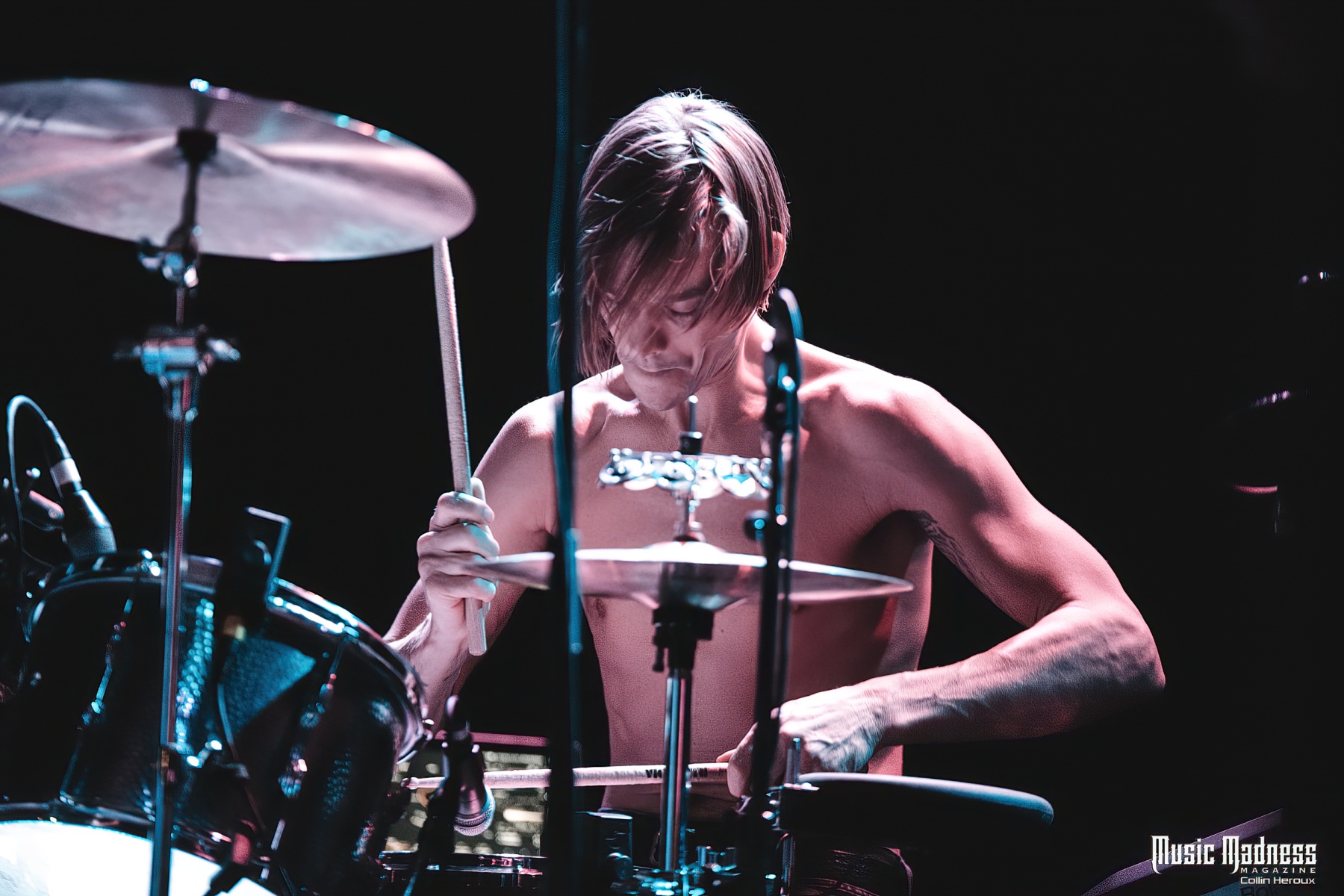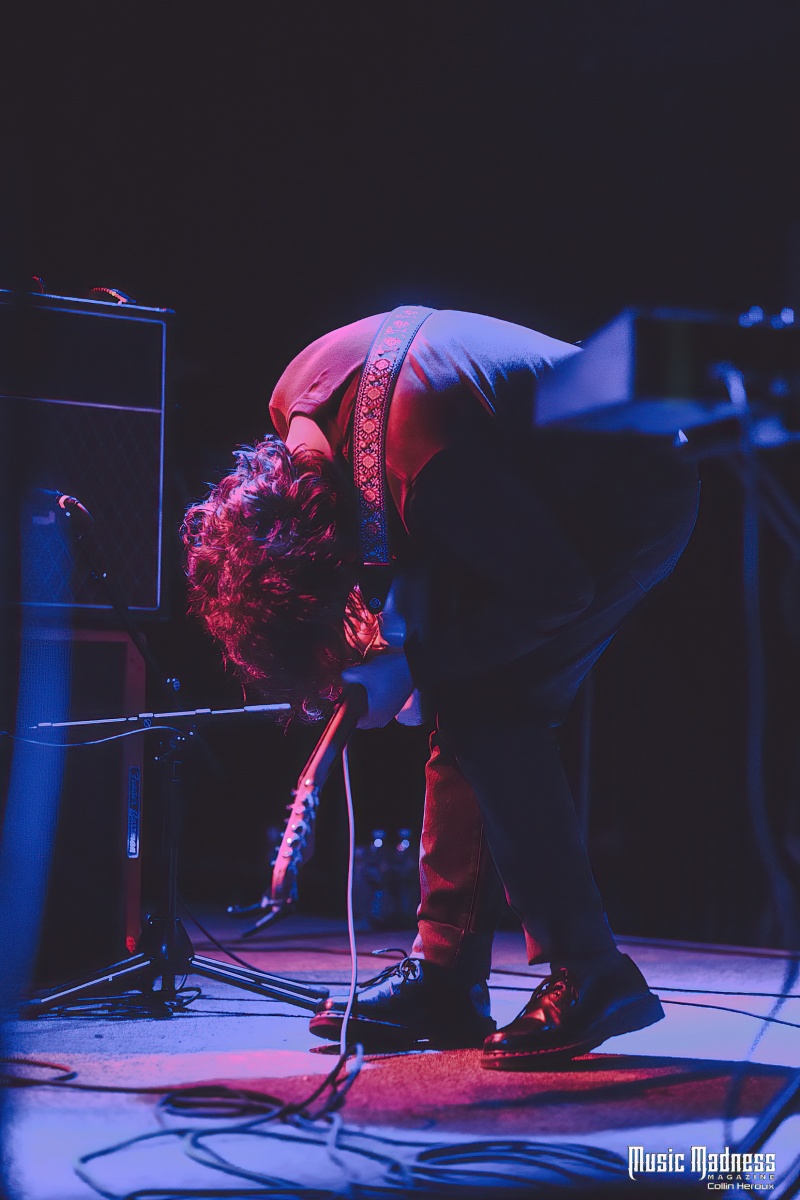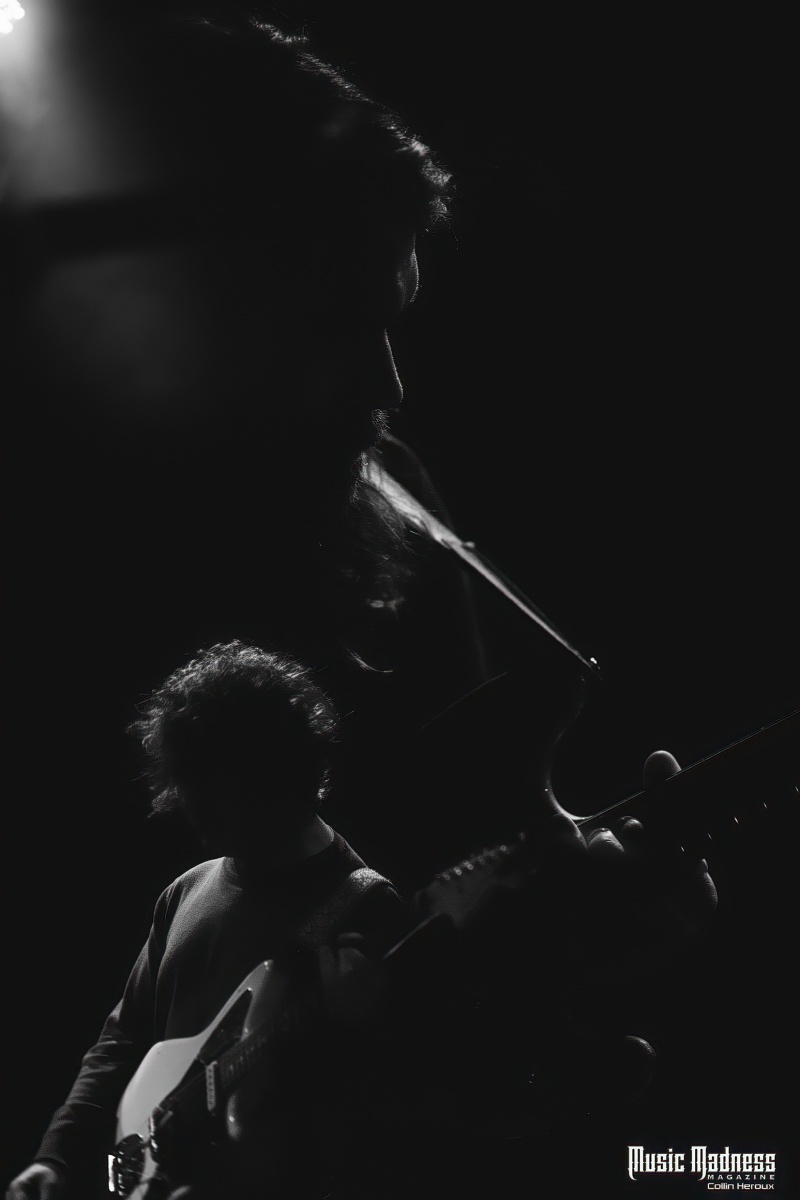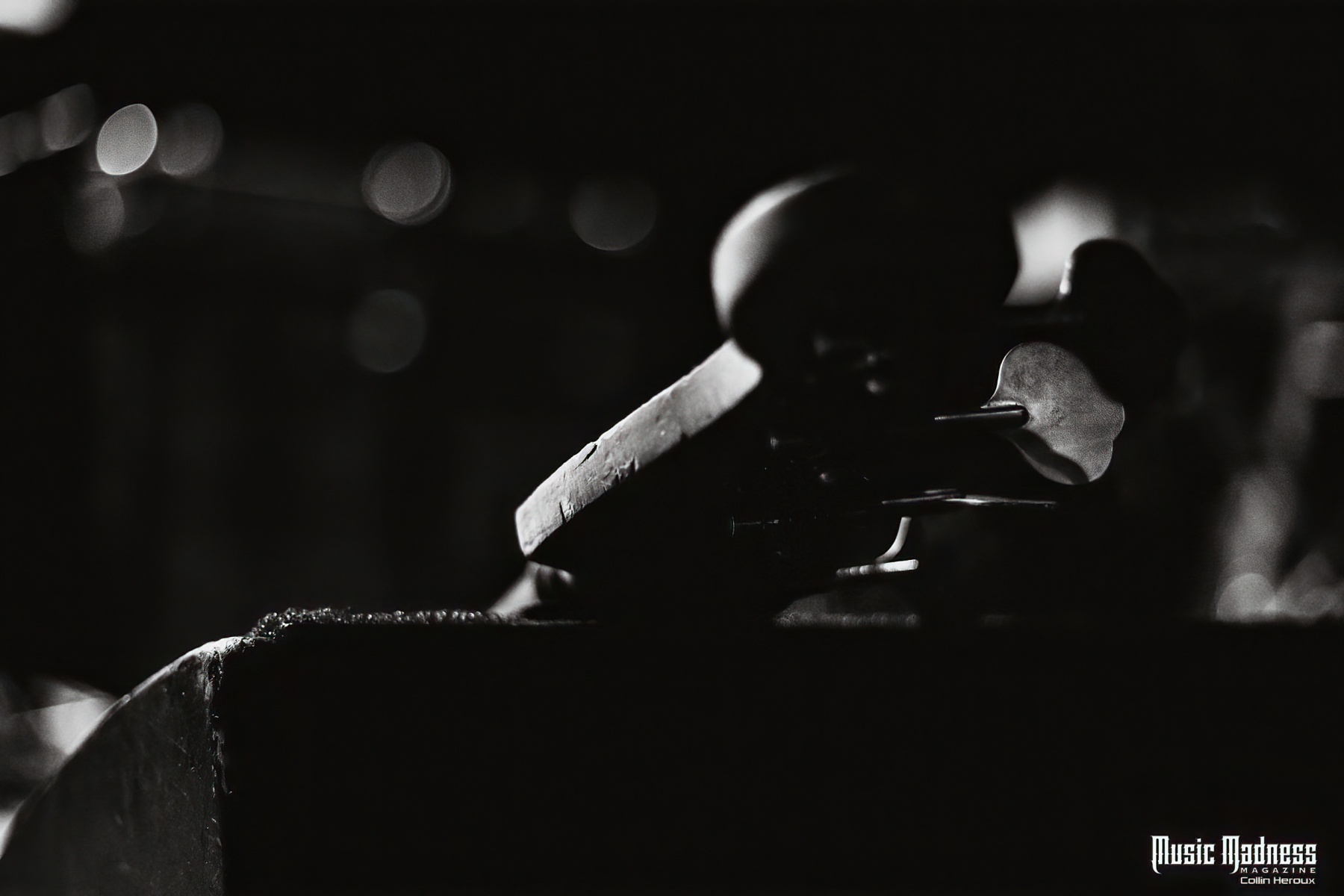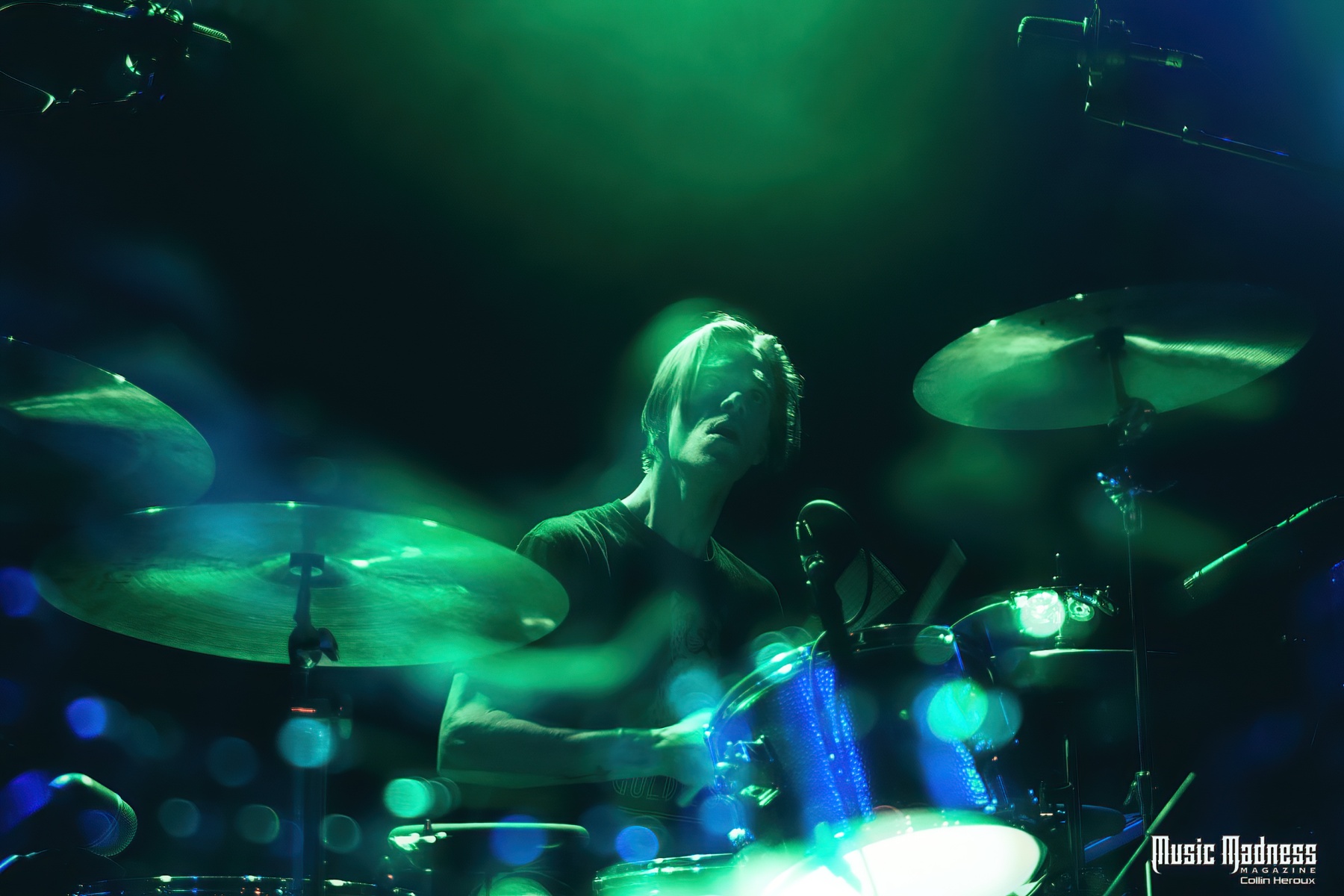
Preoccupations’ Boston-area stop at The Sinclair is a family affair. The Canadian four-piece is fronted by bassist and singer Matt Flegel, and for their fall 2022 they arrive with support from Cindy Lee, the on-stage alter ego of sibling Patrick Flegel, who pulls from their 2020 record What’s Tonight to Eternity in a solo set marked by ethereal vocal manipulations. With Flegel/Lee flanked on either side by cardboard standees of famous models of yesteryear, dressed in garb pulled from the roaring 20s or some revival thereof, at first blush the set strikes something of a different tone to Preoccupations with its frequent sampled callbacks to older music. However, it quickly evolves and expands to demonstrate both Flegels here have a penchant for noisy synthscapes, Patrick pulling from a different underlying set of inspirations including the likes of Julee Cruise.
For Preoccupations’ part, this tour supports Arrangements – one of their finest releases since they emerged following the dissolution of the former Flegel siblings’ project Women in the mid-2010s. Seven tracks spread over a relatively concise span of 35 minutes, its size lends itself to being performed in full, which is how the band spends the first half of the night before revisiting some highlights from earlier in their catalog. This Cambridge stop was briefly in doubt, as a CT date days before had been postponed when Flegel lost his voice. Thankfully he felt up to performing, although any hint of change would be tricky to note considering the gravelly style with which he typically delivers vocals, charting the peaks and valleys of the album, from subdued rumbles to explosive shouts as intense as any other instrument.

While Flegel solely plays bass on stage, guitarists Scott Munro and Daniel Christiansen each have a host of additional implements available – a synth for each, plus Munro’s tech-laden table that spills out to the floor with an LED-lit pad set beside a healthily-sized guitar pedal board. While one of the characteristics of the band’s music is their tightly-intersecting instrumentals, occupying the deep treads left by the rhythm section of Flegel and drummer Matt Walllace, they’re hardly minimalists like some in post-punk; the noisy constructs that accompany them have always been open to ample variation and experimentation. The guitars become bounding walls on either side of the opener ‘Fix Bayonets!’ and later on, Flegel’s voice bends and morphs in the stripped-down refrain of ‘Death of Melody’. True to its name, the latest in the band’s characteristically nondescript series of titles, Arrangements is an impeccably-produced and layered album, and they’ve carried over as much as is feasible for the live show.
The album’s first lyrical passages are packed full, rushing forth from Flegel as if he can barely keep up with himself. The words chiefly point to apocalyptic outcomes: eyes like vacant kiosks in abandoned malls; ashes and smoke; acid rain. There’s a sense of erosion here, of failing or otherwise-compromised memory – something that has appeared throughout the band’s work including a so-named song from their self-titled second LP. With the shortest song here being 4 minutes, and all others clocking in at nearly five or more, each one of the seven tracks has space to grow and change over its duration, showcasing the band’s mastery of dynamics and pacing. The quickness of ‘Fix Bayonets!’ and ‘Ricochet’ opens up to a pair of slower tracks that focus on a different kind of atmosphere – in ‘Slowly’, Flegel’s bass remains unhurried even as a storm of guitar and synth overtakes his playing, Christiansen basking in the reverb from his amps, head down with one ear turned toward the stack. ‘Advisor’ is a little of both worlds, a patient buildup that gradually adds more new-wave-styled synths until its explosive conclusion wherein Flegel delivers the most uncontrolled vocal of the whole album. It makes the intro repetition of ‘Recalibrate’ feel like some kind of warning siren – Flegel doesn’t play right away and he sings cradling his bass in his arms before he joins back in for vaguely monastic vocal harmonizing. Underneath it all, Wallace’s polyrhythmic constructions see him switch between drums and an electronic trigger pad.

But it’s closer ‘Tearing Up the Grass’ that ties the album altogether, contextualizing everything before with clearer imagery of this “descent” that ravages the scenery. “We’re wasting all our energy / on voices in our memory,” he declares, tracking the theft of people’s attention to devices, devices that provide motivation, the motivation that can be monetized from moment to moment. Despite the outlook, it’s one of the finest songs Preoccupations have fashioned, its back-and-forth guitar pattern somehow the brightest composition the band has released, as well as Flegel’s best vocal delivery.
The second piece of the night belongs to older Preoccupations songs, including two from their first record which appears immediately. Even though it was released in 2015, listening to something like ‘Continental Shelf’ for the first time with its pounding verses and soaring guitars and Flegel’s pained vocals, was a real statement, and hearing it one felt like they were privy to the dawn of a new day in post-punk, a term that even then was still morphing from what it meant in the aughts. The lyrical content foreshadowed what still occupies Flegel’s mind: “Don’t want to reminisce / I can’t remember, can’t remember”; “Nothing is beginning,” he says – seven years later he evaluates things much the same: “It was all over / before it ever began”.
The final songs of the night, each itself a lengthy progression, blend together into a Voltron of the band’s first two LPs. The first movement of ‘Memory’ played live seems even more deliberate in its execution, and its closing drone gives Wallace enough time to dip backstage and return with a drink. He needs it, as ‘March of Progress’ is maybe one of the most demanding songs among the band’s wealth of percussively-complex works. Every couple of measures, Wallace manages to somehow generate 4 individual sounds out of only his toms even though he is swinging each arm only once – its hypnotic fury genuinely defies layman understanding. The drone intro, given form only by those drums, transitions ultimately to the exact opposite – the guitars become sharp and well-defined, bass as well; another bright moment in the band’s catalog made all the more impactful by its rarity. This flexibility and progression has long kept the band’s music vital, a consistent intensity reforged throughout into different shapes and patterns.
Review and photos by Collin Heroux


